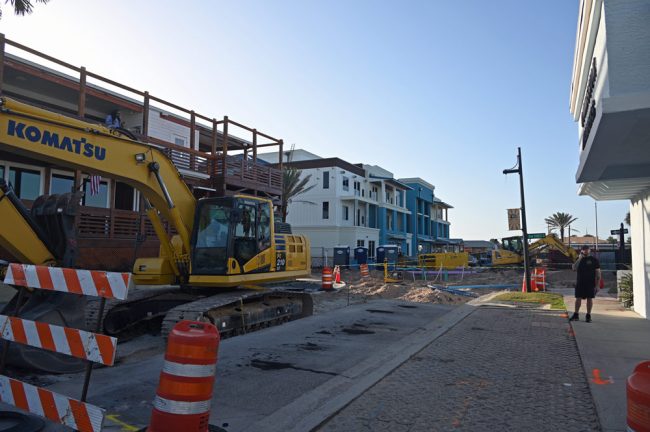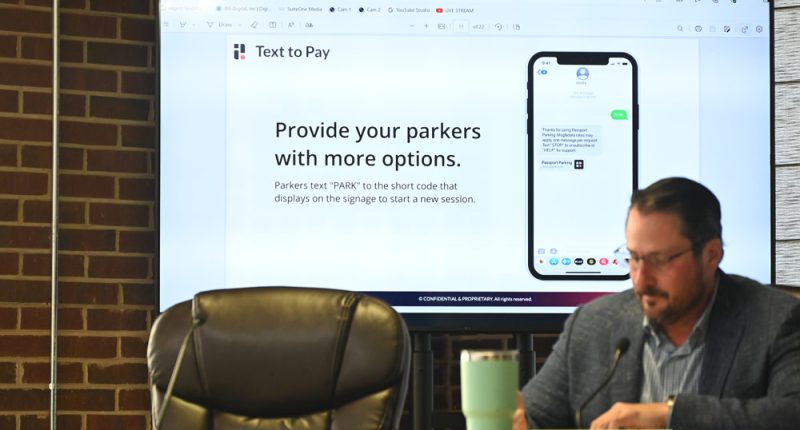
The Flagler Beach City Commission got its first glimpse at an app-based paid-parking system for the city this afternoon from Passport Parking, a company with more than 800 clients across the country. The commission was non-committal, but most Flagler Beach residents who spoke approved of the plan, some guardedly, some enthusiastically–as long as the plan exempts Flagler Beach residents from paying–and some, disbelieving in a parking problem, opposed.
Alexandra Wells, a regional director for the Charlotte, N.C.-based company, told the commission that it could have its system up and running within 60 to 90 days.
But Commissioner Eric Cooley cautioned: “This is a preliminary, preliminary, preliminary discussion. There’s no decisions being made imminently. And when there is, there’s going to be multiple meetings on paid parking. So I don’t want anybody to think the sky is falling or there’s going to be a decision that’s going to be made immediately, and there will be a lot of public input, and this will be a very slow process.”
As it has been in Flagler Beach, which has considered paid parking for years, without movement. But previous plans depended on clunky, rust-prone and high-maintenance parking meters. Like payphones, those relics are disappearing, replaced by app-based systems that require nothing more than signage and spaces.
Passport made its presentation during a one-hour workshop this evening. Several Flagler Beach residents addressed the commission, most in support of a paid parking plan of some sort–but most opposed to charging Flagler Beach residents. Passport’s system will allow for that distinction. The system is based on license plates. Residents could register as residents, and if that’s what the city commission approves, city residents could be exempt from charges.
Whether they would be exempt from parking time limits is another story.
The system would allow the city to map out its streets in zones, to charge some rates in some zones, other rates in other zones, to charge certain rates at certain times of the day and different rates at other times, or to charge more during special events, like Fourth of July. The system would allow for time limits of two, three or any hour the city chooses.
It would also give merchants the option to validate parking for their clients: a restaurant or a hair salon could have its own account, paying clients’ fees through validation. Wells said merchants typically resist paid parking at first only to embrace it subsequently, though a pair of downtown merchants who spoke to the commission today were in support.
“We’re at a point where at least in some parts of the city, all day. During the day, we have tremendous parking issues,” Ted Barnhill, owner of Barnhill’s Bar and Grill across the street from City Hall, on 2nd Street, said. Last month Barnhill submitted a proposal to the city’s planning board to implement two-hour parking in a small zone south of State Road 100. The Planning Board embraced it and sent it up to the City Commission for discussion. The commission has not touched it, even though the proposal is dubbed as a stop-gap between the current situation and the time when a paid parking system is in place.
Ken Bryan, the former city commission, was fully supportive. “Flagler Beach is the only town, pretty much from Jacksonville all the way to Miami, that does not have some type of a charge,” he said. “As a resident, I don’t come over here that much because it’s hard to find a place to park. So I really compliment you on doing this. And I encourage you to do this. As a former commissioner and chairman sitting up there, this is something we need to do in order to help our revenue.”
A North 11th street resident took the approach that appears to have some favor in town: “I don’t even consider it paid parking. I consider it usage fee,” he said, fully supportive of charging, but only out of towners. “Residents of Flagler Beach should never have to pay for parking. Ever. They probably should be reimbursed,” he said.

That goes for drivers of golf carts, who would automatically be exempt from paying, even without license plates, since only Flagler Beach residents are allowed to drive golf carts in the city.
There was opposition. A Flagler Beach resident ridiculed the notion that there’s a parking problem, just as he ridiculed the notion that there’s a traffic problem. “I’m from Atlanta, I know what bad traffic is,” he said, making the comparison with parking. He did not buy the claim that the city would make money.
A group of out-of-towners dressed in the garb of self-proclaimed “constitutionalists” who trooped into the meeting in full activist posture, one of them taking video of the proceedings with his phone. Several spoke in opposition to paid parking, saying the beaches should be free for people to use and one of them, mistaking the Hammock Dunes Bridge for the Flagler Beach Bridge. He said the city should have stopped charging motorists going across years ago.
The city is considered paid parking for some of the reasons Passport cites as beneficial: it would cycle traffic through parking spaces more frequently, to the benefit of businesses, and it would generate some additional revenue for the city, though how much remains unclear. For enforcement, the city would need to either hire a contractor or designate staff.
Passport would charge a flat fee for each parker. The city would get the rest. For example, if a parking charge was $2 for two hours, there would be an additional 25 to 35-cent fee that would go to Passport. The city would take in $2.
“The biggest thing is increased parking turnover and efficiency,” Wells said. It increases foot traffic that benefits businesses, increasing merchant revenue. “There’s enough parking for everyone. It’s just a matter of being better to organize what you have and allocate those spaces accordingly.”
Another running advantage: the company’s improvements to the app and the “user experience” would be automatically applied to its clients, Flagler Beach included, without costs. Nor would there be upfront capital costs for the city. Passport would assume the cost of signs and replacement signs.
But many questions remain.
“I assume this will be a pretty good, big talking point in strategic planning as we plan out the next five years or so,” Commission Chair James Sherman said.









